The executioner of Poles, the man responsible for the Katyn massacre and hundreds of thousands of deportations. In addition, the head of the NKVD terrorizing Poland since 1944. Or maybe ... an unconventional and far-sighted politician who understands the resistance of small nations to Moscow, a man who had a much better offer for Poland than Stalin?
Even before World War I, Józef Stalin found himself passing through Krakow - the staff of the Hawełka restaurant in Krakow's Market Square, hearing the Russian language, treated him bluntly, giving him warm vodka. His hatred of Poles only strengthened when Piłsudski repelled the Red Storm in 1920, and Stalin and Semyon Budyonny, operating near Lviv, were rightly recognized in Moscow as one of the main culprits of the defeat.
The right hand of Stalin and the head of the NKVD - Lavrenty Beria did not have such bad experiences with Poles. Contrary. To some extent, he was no stranger to the Polish-philosopher feelings popular in Georgia. And despite the fact that for most of his Bolshevik career he was forced to faithfully follow the orders of Stalin's Pole-eater, whenever he had the opportunity, he showed that he had a completely different attitude towards our country - which is quite convincingly shown in his provocative biography of Beria of the Sovietologist Françoise Thom.
The Third Reich and the USSR - Beria against Stalin
From the spring of 1939, following the English guarantees for Poland, the Soviet Union was in an excellent position as an arbitrator. Both Nazi Germany and the Anglo-French alliance competed for the favors of the Soviets. Beria unequivocally opted for an alliance with the Western powers.
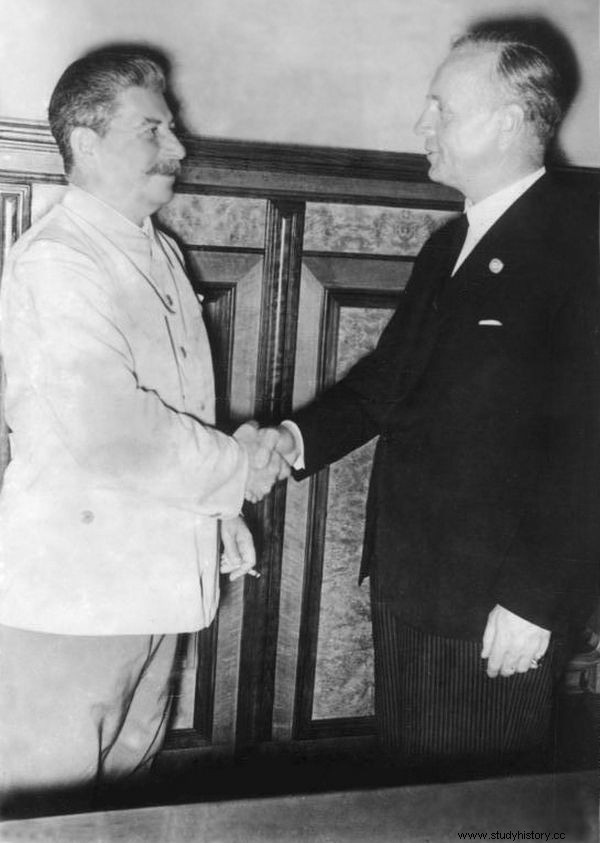
Beria, until August 23, 1939, counted on the agreement of the USSR with England and France. Even though Stalin had already decided on an alliance with the Third Reich. In the photo, Stalin and Ribbetrop in the Kremlin (source:Bundesarchiv; lic. CC-BY-SA 3.0).
Beria's son Sergo recalls: He believed that the pact with Ribbentrop cut us off from all Western civilization. With an ally like Hitler, Stalin didn't have to be embarrassed any more . Stalin, knowing about Beria's sympathies, completely removed him from the negotiations - the NKVD was investigating the possibility of an agreement with England and France until August 23, while the signing of an agreement with Germany was already a foregone conclusion.
Despite the conclusion of the Molotov-Ribbentrop Pact and harmonious Soviet-German cooperation, Beria still assumed that a conflict between the two totalitarian powers was inevitable and was intensively preparing for it. From the spring of 1940, Beria's secret emissaries (e.g. Andrew Rothstein) were probing the Polish government in exile on the creation of a Polish army in the USSR in the event of a Soviet-German conflict.
In the middle of the honeymoon between the Third Reich and the USSR - a friendship that brought the Soviets a piece of Poland, Finland, Romania and the Baltic states; which Stalin and Molotov wanted to maintain and strengthen - Beria was preparing, through his channels, for the German-Soviet conflict!

Talk interestingly and you won't end up in the Katyn pit
The NKVD conducted survey talks with Polish prisoners of war imprisoned in the camps in Kozielsk, Starobielsk and Ostashkov. For example, Beria himself saw General Marian Żegota-Januszajtis, who was considered an interesting interlocutor, because the interrogated person consistently claimed that the Germans would attack the Soviet Union sooner or later and that the Russians would need the Polish army very much.
The general tried to play the Polish-Georgian card, arguing that Beria, as a Georgian, should understand that Poland cannot relinquish Russia to the eastern territories and that Moscow has been a common enemy of both smaller nations for centuries. The head of the NKVD reportedly only smiled slightly. The Polish general treated with honors approached Beria one day:
" There is no indictment against me, you say that I am free, but I am sitting in a cell in Lubyanka." He looked at me piercingly and said:"Are you pretending, do you really not understand that the only safe place in the Soviet country is the cell in Lubyanka?" .
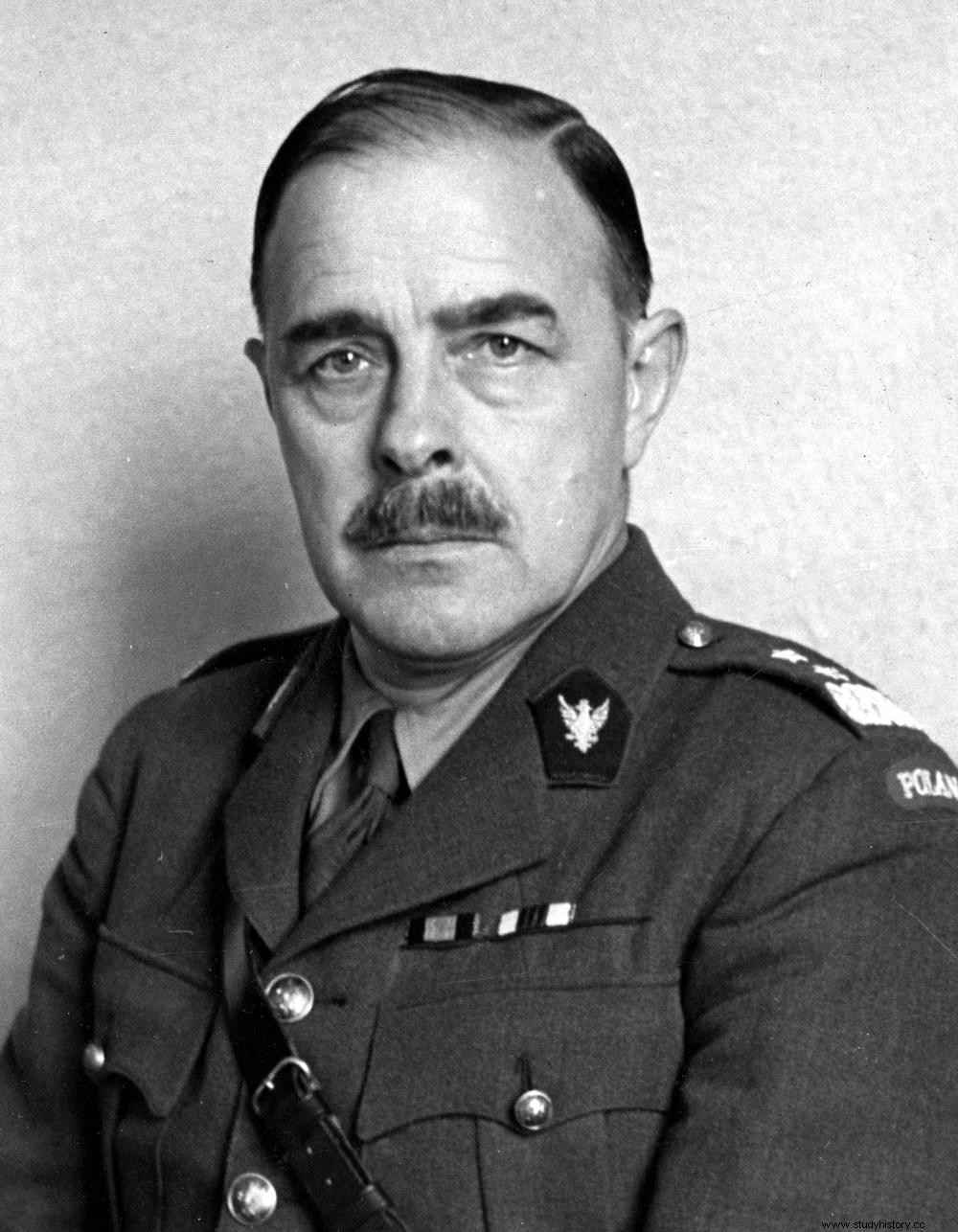
General Marian Żegota-Januszajtis was recognized by the NKVD as an interesting interlocutor because he stuck to the thesis that after the German attack on the USSR, Stalin would need an army (source:public domain).
Beria already knew what would happen to the thousands of Polish officers who would not be recognized by the NKVD as equally promising interlocutors ...
Slaughter of Polish officers - did not want to, but had to?
On March 5, 1940, the Soviet Politburo, at the request of Beria, decides to shoot more than 20,000 Polish citizens without trial. Why was Beria signing a motion for genocide of the Polish elite with one hand to the Sikorski government? Françoise Thom points to indirect evidence that the head of the NKVD had no choice but to sign Stalin's idea with his own name.
This article has more than one page. Please select another one below to continue reading.Attention! You are not on the first page of the article. If you want to read from the beginning click here.
Take, for example, the deletion of Beria's name on the document containing the names of the three who were to condemn Polish officers to death (unprecedented in Soviet archives!) Or the memories of Beria's son, who claims that his father was categorically against the execution of Polish officers.
In the fall of 1940, when German-Soviet relations were beginning to deteriorate, Beria presented Stalin with a project to create a Polish division headed by General Januszajtis, but the commander immediately rejected it, not wanting to irritate the powerful ally. Nevertheless, the NKVD placed a group of pro-Soviet Polish officers (headed by Zygmunt Berling) in comfortable conditions in the Małaszowce villa near Moscow and secretly continued the talks.
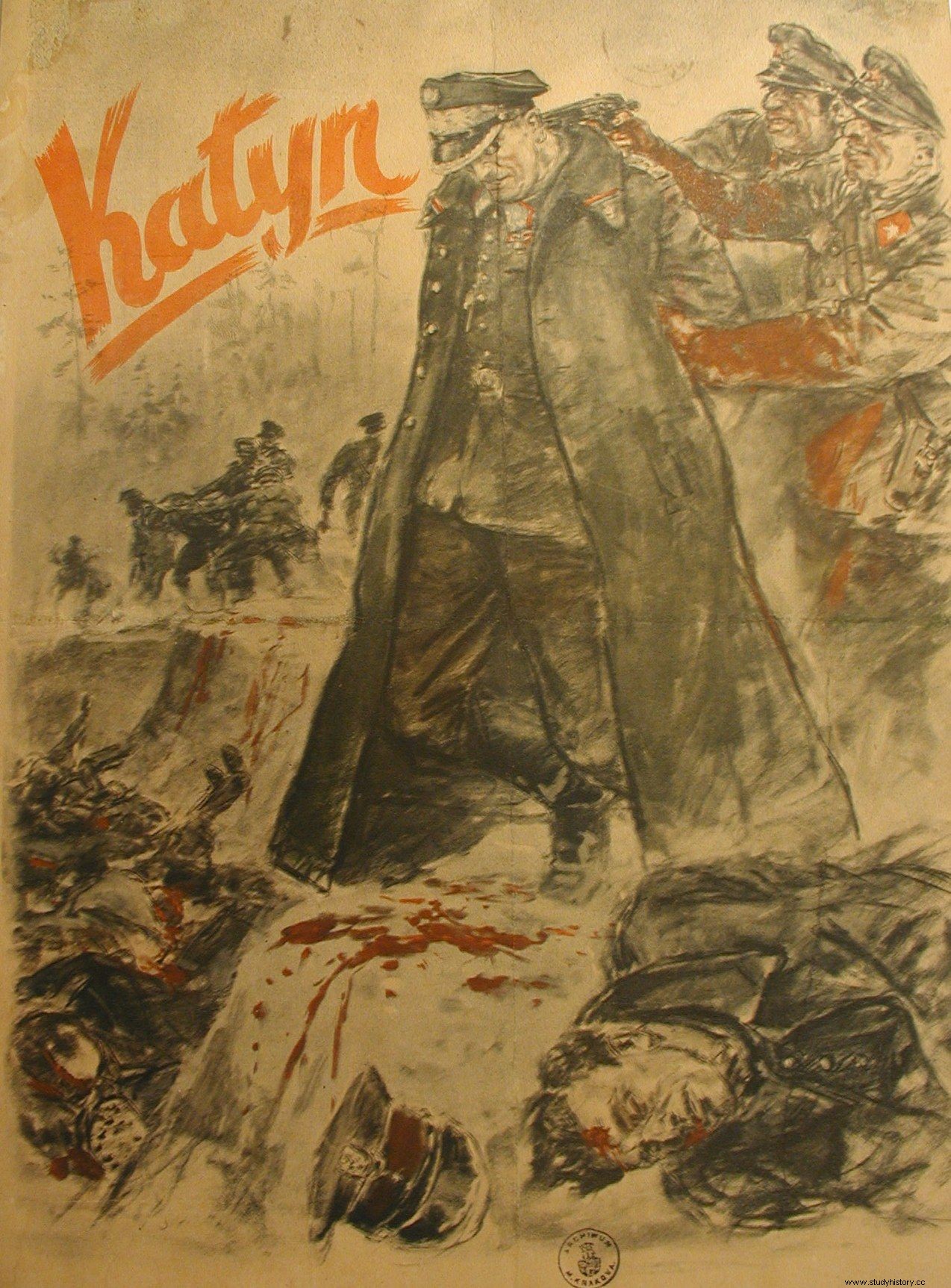
There are many indications that Beria did not really support the order to murder Polish officers (source:public domain).
When Berling asked Beria about the Polish officers from Starobielsk and Ostashkov, from whom he wanted to create the cadre of the Polish division, the latter only pouted: Impossible, these people are no longer in the USSR. And then he added quietly: We made a big mistake .
Beria's plans to create a Polish army in the USSR and cooperate with the government in exile will only be realized after the German invasion of the Soviet Union. The fate of the missing officers was not known to the Polish government at that time ...
Fulfill Anders' every wish
In the summer of 1941, at the urging of General Januszajtis, Beria proposed the appointment of General Władysław Anders as the commander of the Polish army on Soviet territory. Sergo Beria even mentions that the physically exhausted Anders leaving prison was looked after in the first days by the mother of the NKVD chief (sic!). The general himself admitted only that he had left Łubianka in the limousine of the NKVD chief himself .
Beria, having finally received a green light from Stalin for his Polish policy, ordered the NKVD ostentatiously to show respect to General Anders, and he himself presented him with two horses. His every wish is fulfilled - stated Ambassador Stanisław Kot with amazement. In the fall of 1941, when the situation of the Red Army began to become critical, Beria lobbied Stalin to move the Polish army to the Caucasus and allow the British to expand into the Middle East.

Such solutions were geopolitically beneficial for Poland or Georgia, but not for the Soviet Union ... In September, the NKVD allowed the Polish army to move towards Uzbekistan and the Volga, even though the Soviet authorities did not give its consent. When Stalin attacked Beria in this connection, he blamed the local authorities. The head of the security ministry led his own policy more and more clearly, and Stalin, focused on the Wehrmacht approaching Moscow, was not able to supervise everything personally.
Polish order for the NKVD general?
At the turn of 1941 and 1942 (when Stalin was increasingly chilling relations with Sikorski's government), Beria sent him report after report, stressing that General Anders was immensely loyal towards the USSR. It is significant that even after the war, furiously anti-Soviet, Anders still could not praise Beria's liaison with his army - General Georgy Zhukov (not to be confused with the later marshal bearing the same name and surname).
He was even ready to award him with the Order of Polonia Restituta if he knew that he was still alive, and of course if it would not harm him . Aware that Beria and his people were pursuing their own policy, Sikorski warned Anders: He [Zhukov] pretends to be speaking on behalf of the Soviet government. He's playing some game that I don't understand yet.
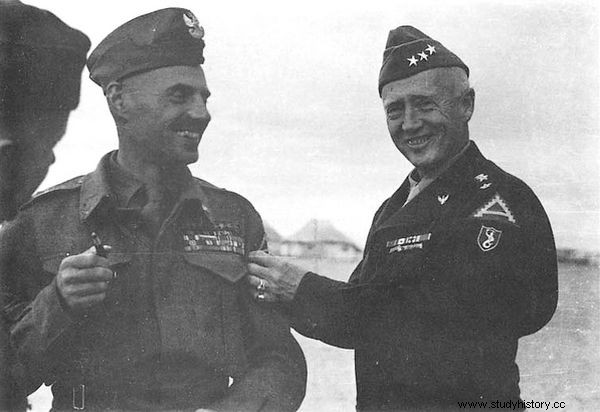
Even the fiercely anti-Soviet General Anders (together with General Patton in the photo) had fond memories of the NKVD liaison officer with his army (source:public domain).
In September 1942, the Polish army left the Soviet Union, contrary to the position of Władysław Sikorski. As Françoise Thom explains:
B eria foresaw the retreat of the Wehrmacht and the liberation of Transcaucasia by the Anglo-Saxons. He probably expected Georgia to be occupied by Anders' army, which also included Georgian officers from exile. There were also numerous officers in this army who, from the autumn of 1941, were thinking about a war with the Soviets in alliance with the rebelling non-Russian citizens of the empire. This explains why Beria supported the withdrawal of Anders' forces by Iran in the summer of 1942.
This article has more than one page. Please select another one below to continue reading.Attention! You are not on the first page of the article. If you want to read from the beginning click here.
After the evacuation of Anders' army from the Middle East, the head of the NKVD wanted to use it to liberate Yugoslavia, which was again useful to the Poles and the British - because it gave a chance to open a second front in the Balkans (according to Churchill's idea) and liberate Poland by the Western allies, not Of the Soviets.
Would Beria give PRL more freedom?
After the Red Army entered Poland, Lavrenty Beria once again proposed a more flexible policy, for example in relation to the Polish independence underground. While Stalin saw in it only an element of anti-Soviet patriotism and focused on physical extermination, Beria wanted to leave at his disposal a number of AK commanders and use Berling's army to "recycle" the Home Army units.
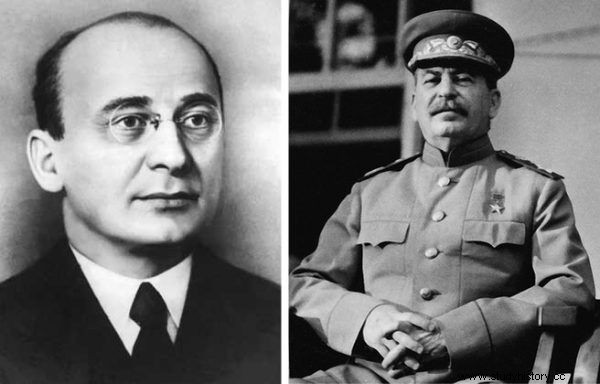
In relation to the Home Army, the head of the NKVD also had a much more flexible position than Józef Stalin (source:public domain).
The head of the NKVD was still ready for some variant of the finlandization of Poland and an agreement with the London government, while Stalin was firmly committed to the brutal, forceful subjugation of Poland to communists. The leaders of the Warsaw Uprising recalled the presence in Warsaw of the mysterious NKVD captain Konstanty Kaługin. He promised to help the insurgents by contacting Marshal Rokossowski on the other side of the Vistula and with Moscow via London. As it has been established, he must have stayed in the insurgent Warsaw without Stalin's knowledge, and after the war he was sentenced to 10 years in a labor camp. To this day, the purpose of Kaługin's mission is a mystery to me - wrote Tadeusz Bór-Komorowski many years later.
Pro-Sovietism yes, communism no
Preparing to organize the post-war world:
N KWD emphasized in its analyzes that the governments of Czechoslovakia, Poland and Hungary could only be pro-Soviet. Beria, however, did not want the communist regime imposed on these countries, as he did not want it for Germany.
Of course, Beria was not guided by her love of democracy or sympathy for the countries of Central and Eastern Europe.

He simply believed that the Americans and the British would never allow the enslavement of half of Europe and that a political landing a bridge too far could prove to be a lethal threat to the Soviet Union. And here, of course, he was very wrong - Stalin had a better sense of the passive and cowardly mentality of the Western leaders, he played for the entire stake and won ...
Georgian who wanted to dismantle the empire
What would the Soviet policy towards Poland look like after the war if Beria had decided, not Stalin? We can only guess, but a good example of the implementation of Beria's political plans was his policy towards the GDR after the workers' uprising there in 1953 (after Stalin's death). The Red Tsar's successor made it clear to the Western Powers that the GDR was a failure and was ready to discuss the reunification and neutralization of Germany and the withdrawal of the Red Army from that country.
Françoise Thom puts forward a shocking thesis: his will to lift Moscow's hegemony over the peoples of the USSR resulted from his aversion to Russian domination, which he could no longer hide . For the remaining heirs of the Stalinist empire, such geopolitical heresies came as a real shock. Beria must have died.
Biography:
- Władysław Anders, Without the last chapter. Memories from 1939 - 1946, Test 1995.
- Stanisław Kot, Letters from Russia to General Sikorski, London, 1955.
- Simon Sebag Montefiore, Court of the Red Tsar , Magnum 2004.
- Marek Sterlingow, Playing with Stalin, votcza.pl, September 4, 2009.
- Françoise Thom, Beria. The torturer flawless , Prószyński i S-ka 2016.
- Marian Żegota - Januszajtis, My life is so turbulent Bis Press 1993.
- Dmitry Volkogonov, Stalin. Virtuoso of lies, dictator of thoughts , Amber 2006.
Buy the book on the Publisher's website:

